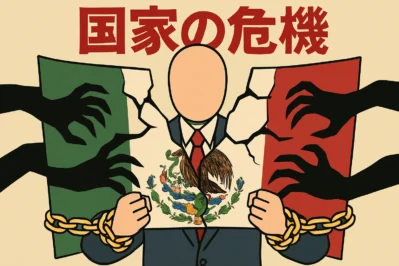Decoding the Crisis: Mexico’s Cartel Wars & National Security
Hello! This is [Maeil Hangeul], here to elevate your Korean to a truly advanced level!
Today, we are moving beyond everyday conversation to tackle a complex and critical global issue: the Mexican drug cartels and the resulting national security crisis. For C2 learners like you, being able to discuss sophisticated socio-political topics is the hallmark of true fluency. In Korea, international security issues are frequently analyzed in news media and academic circles, and understanding the specific terminology will allow you to engage in these high-level discussions. Let’s delve into the vocabulary needed to analyze this multifaceted challenge.
Core Expressions for In-Depth Analysis
Here are five essential terms you need to discuss this topic with the nuance it deserves.
- 1. 치안 공백 (chi-an gong-baek)
- Romanization: [chi-an gong-baek]
- English Meaning: Security vacuum; Public safety void.
- Detailed Explanation: This term is a compound of 치안 (chi-an), meaning ‘public security/safety,’ and 공백 (gong-baek), meaning ‘void’ or ‘blank space.’ It describes a critical situation where the state’s authority and law enforcement are so weak or absent that they cannot maintain order. This void is then often filled by non-state actors, such as cartels. It’s a formal, analytical term used frequently in journalism and academic reports.
- 2. 조직범죄 (jo-jik-beom-joe)
- Romanization: [jo-jik-beom-joe]
- English Meaning: Organized crime.
- Detailed Explanation: This is the standard term for organized crime. It is formed by combining 조직 (jo-jik), meaning ‘organization,’ and 범죄 (beom-joe), meaning ‘crime.’ While you could simply say ‘카르텔 (kareutel),’ using a broader term like 조직범죄 allows you to discuss the issue in a more structural and comparative context, linking it to other global criminal syndicates.
- 3. 마약 밀매 (ma-yak mil-mae)
- Romanization: [ma-yak mil-mae]
- English Meaning: Drug trafficking.
- Detailed Explanation: 마약 (ma-yak) refers to ‘narcotics’ or ‘illicit drugs,’ and 밀매 (mil-mae) means ‘illicit trade,’ ‘smuggling,’ or ‘trafficking.’ This term specifically points to the primary economic activity that funds the cartels. It is a precise term used in legal and news contexts.
- 4. 부패의 고리 (bu-pae-ui go-ri)
- Romanization: [bu-pae-ui go-ri]
- English Meaning: The chain/link of corruption.
- Detailed Explanation: This is a highly sophisticated and metaphorical expression. 부패 (bu-pae) means ‘corruption,’ and 고리 (go-ri) is a ‘link’ or ‘ring in a chain.’ The phrase powerfully illustrates the interconnected and systemic nature of corruption, where politicians, law enforcement, and judicial figures are linked with criminal organizations. Using this term demonstrates a deep understanding of the problem’s structural roots.
- 5. 국가적 위기 (guk-ga-jeok wi-gi)
- Romanization: [guk-ga-jeok wi-gi]
- English Meaning: National crisis.
- Detailed Explanation: Composed of 국가적 (guk-ga-jeok), meaning ‘national,’ and 위기 (wi-gi), meaning ‘crisis.’ This term frames the issue not just as a crime problem but as a fundamental threat to the sovereignty and stability of the state itself. It signifies the highest level of severity in political discourse.
Sample Dialogue: News Analysts’ Discussion
Let’s see how these terms are used in a realistic conversation between two analysts.
A: 최근 멕시코의 국가적 위기 상황에 대한 다큐멘터리를 봤는데, 카르텔의 영향력이 상상을 초월하더군요.
(I recently watched a documentary on Mexico’s national crisis, and the cartels’ influence is beyond imagination.)
B: 맞습니다. 정부가 조직범죄와의 전쟁에서 고전하는 가장 큰 이유 중 하나는 일부 지역의 심각한 치안 공백 때문입니다.
(That’s right. One of the biggest reasons the government is struggling in its war against organized crime is the severe security vacuum in certain regions.)
A: 결국 그 공백을 마약 밀매로 막대한 자금을 확보한 카르텔이 장악하는 악순환이 반복되는 것이죠.
(Ultimately, it’s a vicious cycle where the cartels, funded by immense profits from drug trafficking, seize control of that vacuum.)
B: 무엇보다 이 문제를 해결하기 어려운 근본적인 원인은 사회 깊숙이 박힌 부패의 고리를 끊어내지 못하는 데 있습니다.
(More than anything, the fundamental reason this is so hard to solve is the failure to sever the deep-seated chain of corruption embedded in society.)
Cultural Tip & Trend Analysis
In South Korea, the Mexican cartel situation is often analyzed in major news outlets (like JTBC or YTN) and investigative programs (like 그것이 알고 싶다) as a case study in “state failure” (국가 실패). When Korean experts discuss this, they often focus on the systemic issues.
Pro Tip: To sound like a true expert, don’t just say “corruption is a problem (부패가 문제예요).” Instead, use 부패의 고리 to argue that “The interconnected chain of corruption involving politics and law enforcement is the core obstacle (정치권과 사법기관을 잇는 부패의 고리가 핵심적인 장애물입니다).” This demonstrates a sophisticated, analytical perspective that is highly valued in advanced Korean discourse.
Wrap-up & Practice
Today, we’ve learned five key terms—치안 공백, 조직범죄, 마약 밀매, 부패의 고리, 국가적 위기—that are essential for discussing complex geopolitical issues like the Mexican security crisis.
Now, it’s your turn to practice!
- Fill in the blank: 카르텔의 폭력으로 인해 정부의 행정력이 미치지 못하는 지역에는 심각한 ( )이 발생했다.
- Short Answer: Using at least two of today’s expressions, write one sentence in Korean analyzing the core challenge Mexico faces. (오늘 배운 표현을 최소 두 개 이상 사용하여 멕시코가 직면한 핵심 과제를 분석하는 문장을 한 문장으로 작성해 보세요.)
Share your answers and your own analysis of this topic in the comments below! We’d love to read your insightful thoughts.






